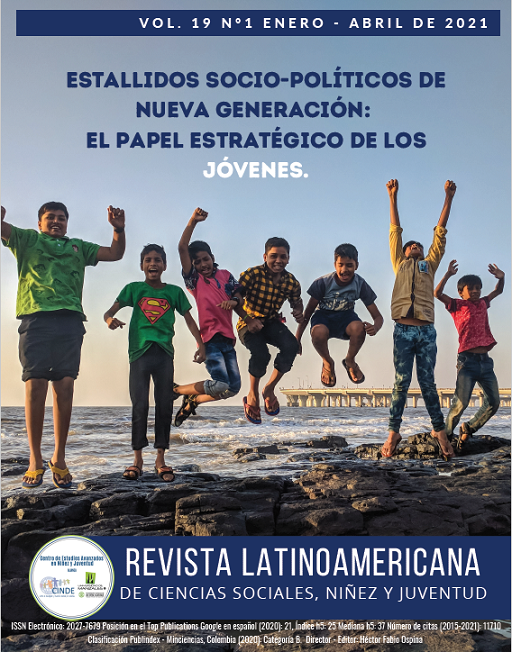From Hogra to Hirak: Neocolonialism, memory and youth political dissidence in the Rif
Main Article Content
Abstract
Abstract (analytical)
Dominant social movement theories are based on Western experiences, but to what extent can they help us to understand the process of solidarity construction of political practices in closed political non-Western contexts? As Bayat points out, a theoretical approach that takes into account both the Arab exceptionality and the critical application of social science models in other contexts —that often forget the specific features that political protest has adopted in the Arab World— seems essential. This article, within the framework of the Transgang project, will analyse a Moroccan social movement that appeared in the Rif in 2016, led by youth populations, attending to their cultural specificities, and using decolonial perspectives. Through this analysis, some conclusions will be presented for research on youth social movements in Arab societies.
Keywords: Youth, social movements, colonialism, decoloniality, Arab Spring, Hirak, Rif, Morocco.
Downloads
Article Details
You are free to:
- Share — copy and redistribute the material in any medium or format
- Adapt — remix, transform, and build upon the material
- The licensor cannot revoke these freedoms as long as you follow the license terms.
Under the following terms:
-
Attribution — You must give appropriate credit, provide a link to the license, and indicate if changes were made. You may do so in any reasonable manner, but not in any way that suggests the licensor endorses you or your use.
-
NonCommercial — You may not use the material for commercial purposes.
-
ShareAlike — If you remix, transform, or build upon the material, you must distribute your contributions under the same license as the original.
- No additional restrictions — You may not apply legal terms or technological measures that legally restrict others from doing anything the license permits.
References
Al-Maarouf, M. D., & Belghazi, T. (2019). The event of death: Reflections on the dynamics of emotions and embodied resistance in the Moroccan contexts of hirak (movement) and la hirak ((non)movement). Journal of Cultural Studies, 33(4), 632-656. https://doi.org/10.1080/09502386.2018.1543335
Al-Messiri, S. (1974). Ibn al-balad: A concept of Egyptian identity. Brill.
Al-Sharnouby, D. (2017). In absence of a hero figure and an ideology: Understanding new political imaginaries and practices among revolutionary youth in Egypt. Middle East Topics & Arguments, 9, 84-95, https://doi.org/10.17192/meta.2017.9.6835
Bamyeh, M. A. (2012). Anarchist philosophy, civic traditions and the culture of Arab revolutions. Middle East Journal of Culture and Communication, 5(1), 32-41. https://doi.org/10.1163/187398612x624355
Bayat, A. (2013). Life as politics: How ordinary people change the Middle East. Stanford University Press. https://doi.org/10.1515/9780804786331
Burke, E. (1986). Understanding Arab social movements. Arab Studies Quarterly, 8(Fall), 333-345.
De Madariaga, M. R. (2009). Abd-el-Krim el Jatabi: la lucha por la independencia. Alianza.
Feixa, C. (Dir.), Sánchez-García, J. (Coord.), Ballesté, E., Cano-Hila, A. B., Masanet, M.-J., Mecca, M., & Oliver, M. (2019). La (Trans) banda: notas y cuestiones para la investiga-ción de grupos juveniles de calle (Transgang Working Papers 2.2). Universitat Pompeu Fabra; European Research Council. https://doi.org/10.31009/transgang.2019.wp02.2
Grosfoguel, R. (2011). Racismo epistémico, islamofobia epistémica y ciencias sociales coloniales. Tabula Rasa, (14), 341-355. https://doi.org/10.25058/20112742.431
Hodgson, M. (1974). The venture of Islam: Conscience and history in a world civilization: Vol. 1. The classical age of Islam. University of Chicago Press.
Honwana, A. (2013). Youth and revolution in Tunisia. Zed Books.
Human Rights Watch. (2018). Informe Mundial 2018. http://bit.ly/2LIVDe9
Loudiy, F. (2014). Transitional justice and human rights in Morocco: Negotiating the years of lead. Routledge. https://doi.org/10.4324/9781315856063
Martín, M. (2002). El colonialismo español en Marruecos (1860-1956). Club de Amigos de la Unesco.
Melucci, A. (1991). La acción colectiva como construcción social. Estudios Sociológicos del Colegio de México, IX(26), 357-364.
Mignolo, W. (2015). Habitar la frontera: sentir y pensar la descolonialidad. CIDOB.
Peregil, F. (2018). El líder de las protestas del Rif, condenado a 20 años de cárcel. El País. https://elpais.com/internacional/2018/06/27/actualidad/1530085677_392283.html
Quijano, A. (1989). Modernidad, identidad y utopía en América Latina. El Conejo.
Quijano, A. (2014). Cuestiones y horizontes: de la dependencia histórico-estructural a la colonialidad/ descolonialidad del poder. Clacso.
Salafranca, J. (2001). El sistema colonial español en África. Algazara.
Sánchez-García, J. (2018). De la esperanza a la represión: el interminable «estado de emergencia» en Egipto. En L. Queirolo-Palma, & L. Stagi (Eds.), Winou el shabab (pp. 81-114). Genova University Press.
Schielke, S. (2015). Egypt in the future tense: Hope, frustration, and ambivalence before and after 2011. Indiana University Press. https://doi.org/10.2307/j.ctvxkn64g
Seddon, D. (1986). Riot and rebellion: Political responses to economic crisis in North Africa, Tunisia, Morocco and Sudan. University of East Anglia.
Singerman, D. (1995). Avenues of participation: Family, politics and networks in urban quarters of Cairo. Princeton University Press.
Slymovics, S. (2005). The performance of human rights in Morocco. Pensilvania University Press.
Tilly, C. (2004). Social movements, 1768-2004. Paradigm Publishers.
Vairel, F. (2015). Politique et mouvements sociaux au Maroc. Presses de Sciences.
Walton, J., & Seddon, D. (1994). Free markets & food riots: The politics of global adjustment. Blackwell.

